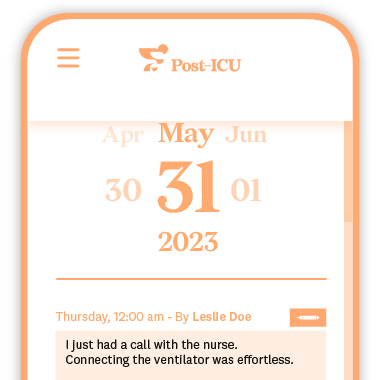ICU diaries are a novel approach for supporting patients and their families through the ICU stay.
Journaling has proven to be therapeutic for families during the traumatic and stressful time when their loved one is in the ICU1Nakashima, H., & Gallegos, C. (2020). Journal Writing by Families of Critically Ill Patients: An Integrative Review. Critical Care Nurse, 40(5), 26-37.. After the ICU stay, the entries in the diary help them piece together their time in the ICU, process the trauma, and regain the best possible quality of life through psychological healing.2Barreto, B. B., Luz, M., Rios, M. N. D. O., Lopes, A. A., & Gusmao-Flores, D. (2019). The impact of intensive care unit diaries on patients’ and relatives’ outcomes: a systematic review and meta-analysis. Critical Care, 23, 1-10.
The contributions of ICU professionals are key in this process. As those who spend the most time with ICU patients, ICU staff has a unique viewpoint, can provide timely and regular updates, and are the ones who are accompanying and caring for ICU patients on their journey to recovery. It is therefore crucial for ICU nurses and doctors to participate in the shared narrative an ICU diary contains.
One common concern is that the ICU staff is too busy to do this. While it’s true that ICU staff is extremely busy and sometimes overwhelmed with the amount of work you have, the diary has been shown to streamline communication, reduce phone calls with families, and lessen the administrative burden nurses experience in the ICU. The couple of minutes it takes to create an entry saves time in other areas and provides additional benefits for everyone—nurses, families, and patients. Let’s discuss these benefits below.
The reasons and benefits shared below are a product of Post-ICU Digital Diary’s extensive experience in over 30 ICUs. These reasons were shared with us by those using the diary.
Shared Narrative
With your contributions to the ICU diary, you directly participate in the shared narrative that patients can access during recovery to regain memories and understand their critical illness experience. The power of a shared narrative lies in the fact that a story is created for the patients by the people around them, those who are awake and conscious and can tell the same story from different perspectives. For patients who are in a coma, sedated, and unconscious for longer periods, having this story, or narrative, told by multiple people can help them regain a sense of control, piecing together what happened as if they were there to witness it. Therefore, having as many contributions from different perspectives as possible is very helpful for patients.
Provider Perspective
Related to the shared narrative, the ICU provider perspective is unique because ICU staff spends the most time with patients, observing everything that happens 24/7. ICU staff doesn’t miss anything, so your entries in the diaries can provide comfort and a sense of connection for patients during a disorienting time. It’s a perspective that families cannot offer to their loved ones.
Improved Communication
Diaries facilitate better communication between staff, families, and patients. It’s an open channel that can be used by everyone and often helps staff feel more connected to patients and their families. Better, easier communication helps you build a better relationship with families and patients. To providers, these relationships are invaluable because they influence patient and family experience and satisfaction, increase patient compliance, and make the entire care more person-centered. Better communication and connection with your patients and their families can reduce stress and help you experience and deliver more humanized care.
Increased Appreciation
As ICU staff, you are with patients 24/7, tracking everything that’s happening, supporting them through every situation, good or bad, helping them communicate, stand, drink, keeping them clean, and treating them with dignity and respect. We know that, you know that, and families of patients also know that, but due to the stress and trauma of what’s happening to their loved ones, they can sometimes temporarily forget just how much high-quality care you’re providing. Your entries in the diaries will show the family and patients how much you’re involved in patient care, leading to more appreciation of your role in their care and recovery.
Engage Families in Care
One of the strongest benefits of ICU diaries is how effective they are in engaging families in the care of their loved ones. Family participation has been shown to reduce the length of stay in the ICU, which has numerous benefits for patients—reduced readmission rates, reduced mortality, and overall better outcomes. Family participation helps not only patients but family members as well. Regaining control over the situation and reducing the feeling of powerlessness helps family members’ anxiety and reduces the chances of Post-Intensive Care Syndrome – Family.
Through your contributions to the diary, you’ll keep families informed, build trusting relationships and stronger connections, involve the families in care, and leave a story for your patient in recovery to read, understand what happened to them, process the trauma, and cope with what happened.
Post-ICU Diary: A Digital Solution for Patient-Centered ICUs
Creating an ICU diary entry with a digital solution takes a couple of minutes—this is just one of the advantages of the Post-ICU Digital Diary.
- Prompts: Prompts help you make an entry quickly, especially if you’re not sure what to write at that moment.
- Multimodality: You can quickly and easily add text and photos to the diary.
- Date and time: You don’t have to think about that; the diary automatically dates your contribution so the story is chronological.
- Privacy: You don’t have to worry about a paper notebook, where you left it, or if someone can open it and read through the entries.
- Communication: You can improve the quality of communication as well as reduce the need for phone calls with families and constant updates.
Quick, easy, privacy-preserving, with numerous benefits for patients, families, staff, and hospitals. If you want to learn more about the Post-ICU Digital Diary, contact our team today.





